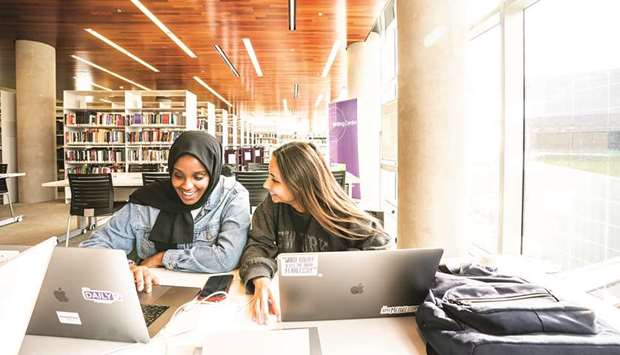Grants from the Qatar National Research Fund (QNRF) to investigate entrepreneurship among the migrant community in Qatar and car safety for children have been awarded to faculty and students from Northwestern University in Qatar (NU-Q).
The funds, as part of QNRF’s annual Undergraduate Research Experience Programme, are provided to foster and develop a culture of research as an important element of undergraduate education.
“Engaging in systematic research and rigorous content is an important component of the Northwestern educational experience,” NU-Q dean and CEO Everette E Dennis said in a press statement.
“By participating in these projects, our students gain valuable analytical and intellectual skills that will open new opportunities for them and broaden their educational experience.”
To better comprehend migrants’ overall contribution to Qatar through entrepreneurship, a group of NU-Q students – Inaara Gangji, Mohamed Sikandar Ali Chaudary, and Asma al-Sulaiti – will work with NU-Q Professor Hasan Mahmud to research how migrant workers are able to navigate Qatar’s start-up and kafala regulations to set up their own businesses.
“Entrepreneurial activity among migrant workers contributes significantly to the development of the local economy,” Mahmud said.
“Through our exploration of how much these businesses impact the local community, we will be able to extrapolate a policy that could help local businesses and promote economic resilience in Qatar.”
In a second research project, NU-Q professors, Susan Dun and Sam Meekings, will work with five students and graduates – Hatim Rachdi, Faisal Albadi, Amina Niksic, Nada Bedair, and Buthayna al-Mohamadi — to investigate why infants are among the most common victims in road accidents in Qatar and to change attitudes and behaviours so more parents protect their children by using car safety restraints.
Dun said that the grant was instigated by some “shocking statistics on fatalities and injuries in car accidents, and the lack of protection and safety for children in moving vehicles.”
She noted that the students participating in the project will “learn by being involved in all aspects of research and data collection, then use their finding to make tangible change in the attitudes about and use of child safety restraints by parents and guardians in Qatar.”
Rachdi, one of the student researchers participating in the project, added that the issue is important “because it concerns one of the most valuable segments of our population, children.”
He noted that the project will include developing an awareness campaign to promote the implementation of car safety measures and to influence behavioural change in the local community.
Over the past eight years, NU-Q received 11 grants from QNRF, which has resulted in NU-Q students and faculty investigating a wide variety of issues, including how to cultivate a science-based community in Qatar, the community of Qatari women majlis, driving behaviour, Qatar’s foreign aid strategy, and of the development of the Qatar national identity, among others.

NU-Q students and faculty will use the grants to explore new areas of research.
